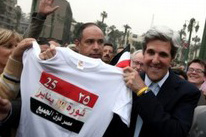Guantánamo, Cuba, an important eastern city near the eponymous Naval Base, the streets recently reverberated with shouts of “Down with Fidel! Down with Raúl!” and “The streets belong to the people!” as dozens marched in open defiance of the iron-fisted rule of the Castro brothers. Even the physical attacks hurled by the regime’s paid thugs did not prevent the march from continuing.
Over the past few months similar protests have taken place across cities and towns throughout the island. What do they portend?
To most people, popular uprisings against dictatorships appear spontaneous because they capture our attention at their moment of fruition, when massive crowds in public plazas attract television cameras. In truth, uprisings are the result of many years of individuals struggling to overcome personal fear, and of tenacious organizational work by small groups.
Resistance networks that grow through repressed societies act like arteries that arouse a subjugated people, a key event or moment serving as the critical spark, the catalyst for the awakening. The death last year of prisoner of conscience Orlando Zapata Tamayo, an Afro-Cuban bricklayer, perpetrated by the authorities’ denial of water for 18 days in an attempt to force him to stop a hunger strike, set off a wave of street protests and hunger strikes. International condemnation forced the dictatorship to release hundreds of political prisoners. Many of those released were pressured into exile, but a hard core of political prisoners chose to remain on the island, their leadership qualities thereby growing exponentially in the eyes of the population.
The Castro dictatorship is once more trying to stem the growth of such resistance in Cuba through persecution and brutality because popular demonstrations, unprecedented in number and message, have erupted throughout the island, among them:
The announcement was made by Mariela Castro, daughter of Raul Castro and the director of Cuba’s national sex education center, during an interview with Spanish broadcaster Cadena Ser earlier this month. Castro, the island’s leading gay rights advocate, said Cuban authorities are already studying the proposal in preparation for the upcoming Community Party conference on Jan. 28.
“This is a historic opportunity, and I think we’re close to having draft legislation,” said Castro, who also revealed in the interview that gay Cubans can serve in the military. “We’ve been working on this issue for a long time, with a lot of activism. We’re starting to see results and a political solution.”
Certainly the recognition of same-sex civil unions would be a landmark achievement — for Mariela Castro and the island’s gay rights activists. But it also prompts the question: Why has it taken Cuba so long?
After all, six other Latin American nations already recognize same-sex civil unions: Uruguay, Colombia, Ecuador, Brazil, Argentina and Mexico (in certain states). Why then is Cuba, a largely secular society where left-wing politics have dominated for 50 years, still slow to grant full legal equality for gays and lesbians? As Castro told the interviewer, “A socialist society can’t be a homophobic one.”
But it has been one in the past.
In the decades following Fidel Castro’s 1959 Cuban Revolution, gay Cubans endured various forms of harassment, and many in the late 1960s were sent to military labor camps to be “rehabilitated” by grueling agricultural work. The socialist “New Man” envisioned by Che Guevara was strong, self-sacrificing, masculine — and unambiguously heterosexual.
When the Cuban government screened the film “Brokeback Mountain” on national television in 2008, church spokesman Orlando Marquez wrote [6] “I respect homosexual individuals, but not the promotion of homosexuality. We’re going down a dangerous path when our own state institutions promote programs that undermine the foundations of our society.”
“While homosexual behavior isn’t new,” he wrote, “the international agenda that promotes homosexuality at all levels is.”
Marquez, who is also the editor of Palabra Nueva, the church’s magazine, declined to comment on Mariela Castro’s announcement, referring inquiries about the Church’s views to previously published statements opposing same-sex unions, including declarations on the subject by the Vatican and Cuban Cardinal Jaime Ortega.
In Cuba’s gay community, the reaction to Mariela Castro’s announcement has been enthusiastic, but also mixed. Ailec Garcia, 32, said that while her partner of seven years was eager to formalize their relationship, it wasn’t a priority for her.
“It’s hard to get excited about it when you still live with your parents and can’t think about having a house of your own,” Garcia said, explaining how Cuba’s miserably low salaries and acute housing shortages make sobering realities of many couples’ domestic aspirations, whether they’re gay or straight.
Castro did not go into detail about what legal benefits the unions might bring. But Cuba is also a country where the practice of marriage has also been in dramatic decline and many heterosexual couples go unwed, even after they’ve had children, since they can’t afford to have a wedding and would derive few legal benefits.
Still, Garcia said, the legalization of same-sex civil unions would carry enormous symbolic importance for the country. “We still have a long way to go toward eliminating machista attitudes and taboos,” she said. “But it would be a huge step forward.














